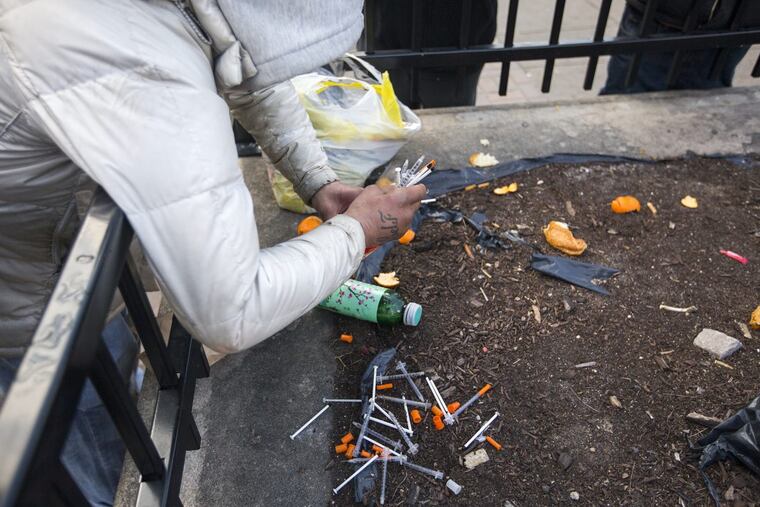It's ludicrous that Camden doesn't have a needle exchange | Mike Newall
Any politician or city leader that bows to the stigma surrounding needle exchanges is only adding to the crisis - adding to the dead.

The sun was still shining when they started reading the names of the dead at the stadium under the Ben Franklin Bridge in Camden. It was October of last year, and I was at a vigil for 900 overdose victims from South Jersey and across the region. The vigil's organizers read the names to the strains of a symphony. By the time they finished, it had been dark for hours.
I remember looking at the bridge, bathed in the lights from the stadium, as the PATCO train rumbled overhead to Philadelphia — one of the arteries of a crisis that's engulfed the whole region. No one is spared, the politicians told the crowd that night. The opioid epidemic has touched every community.
I thought of that night again when reading my colleague Aubrey Whelan's story on Camden's needle exchange — or lack thereof. The exchange, where people can receive clean needles, the overdose-reversing spray naloxone, and other health care to keep them alive — and build the trust necessary to access treatment — shut down two years ago after it was displaced by development. It still hasn't reopened, as the death toll rises. In Camden County alone last year, 277 people died of overdoses.
It's ludicrous that Camden doesn't have a needle exchange. The debate itself is a relic from 1992, when Philadelphia first opened its own exchange amid widespread pearl-clutching (and threats from the state to arrest its organizers). But in 2018, we have a quarter-century of evidence proving needle exchanges save lives. It's demoralizing to have to even trot it all out again — and shameful to litigate arguments that already have been won. But here goes: In 1992, nearly 50 percent of new city HIV cases started with the sharing of a needle. Now, that number is down to 5 percent. In Kensington, the exchange workers saved 280 people by administrating Narcan to overdose victims around the site — and flooded the neighborhood with 6,000 kits of the lifesaving antidote.
Kensington, one of only three exchanges in the state, has been bearing the weight of the opioid crisis for all of Southeastern Pennsylvania. And since Camden's shutdown, it's picking up the slack for South Jersey, too.
Outreach workers are seeing more people from Camden and beyond, said Jose Benitez, the director of the needle exchange. They're doing their part and so much more.
But Camden is not alone in digging up old arguments: Remember last month, at the City Council hearing on the opioid crisis, when Councilman Mark Squilla used most of his time to ask questions about efficacy of medication-assisted treatment, the gold standard for treating opioid addiction? We waste time and risk lives when we continue asking questions that already have answers.
Philadelphia's Health Department, to its credit, has taken real strides to normalize harm-reduction measures like needle exchanges and distributing naloxone — and is now rightfully working to open a safe injection site. It's a concept based on the simple principle that you can't help someone who's died of an overdose. And if you meet people where they're at in their addiction, you're also easing the trauma the crisis visits on a community.
If we're going to call this a crisis that touches every community, then our measures to fight it must be in every community as well. That means we need them in every corner of Philadelphia, across the state — and across the river, too.
In the meantime, Kensington shouldn't bear the full burden. And to remedy that, we need to stop thinking about harm-reduction measures as a burden. We need to start thinking about them as normal community efforts to help our neighbors who are suffering — and ease trauma for everyone.
Philly is slowly, belatedly starting to have the tough conversations about measures like safe injection sites that will make a difference.
Meanwhile, our neighbors across the river are still talking about people's perceptions of needle exchanges.
That's how Camden city spokesman Vincent Basara put it: We have to keep in mind the "perceptions" that come with a needle exchange.
But all we need to understand is that it saves lives. And any politician or city leader who bows to the stigma surrounding exchanges is only adding to the crisis — adding to the list of names we'll all gather to read in the darkness under the bridge next fall.